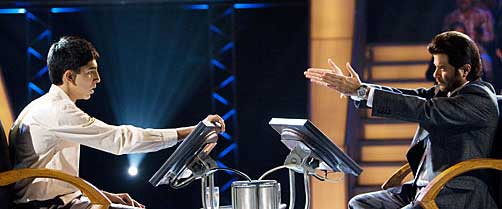 Next
Next up on the weekend bill,
Danny Boyle’s sadly overrated Slumdog Millionaire. (Yes, I know I said
I’d be skipping this one, but it just fit too perfectly between two other movies I was trying to see that day. Besides,
fear is the mind-killer and all that.) Now, lest anyone think I just went into the film with a closed mind, I see movies all the time that I expect to be lousy and discover in fact to be really good. (
Letters from Iwo Jima and
In the Valley of Elah come to mind.) Still, while I suspected I might have to grit my teeth through some of the more implausibly “romantic” parts of
Slumdog, I never expected that I’d be so bored by it.
Partly a Dickensian travelogue through the horrors of Mumbai slum life, partly a generous heaping of third-world-despair pr0n leavened with a very first-world cherry on top (A game show can change your life!), Slumdog Millionaire is in essence a feel-good, less resonant version of Fernando Meirelles’ City of God. If you can remain relatively ambivalent about cartoonish, over-the-top villains, characters who make random decisions solely to further the plot, a lot of chase scenes set to (admittedly catchy) bhangra, and, of course, a thoroughly implausible saccharine-sweet ending, Slumdog Millionaire may be more up your Mumbai back-alley than it was mine. For everyone else, do not pass go, do not collect $200. Make no mistake: As cloying as Little Miss Sunshine at times, this is really the Crash of this year’s Oscar crop (and, very possibly, the worst million-related Best Picture winner since Million Dollar Baby in 2004.)
Slumdog Millionaire begins, improbably enough, with a torture scene. Having gotten within one question of the big payday in India’s version of Who Wants to Be a Millionaire?, our hero Jamal (Dev Patel, an appealing presence) has been strung up at the local police precinct in Mumbai and hooked to a rusty car battery. His crime? Why, cheating, of course — there’s no way an itinerant slum kid and chaiwalla (tea carrier) could’ve known all the answers…could he? Since Jamal won’t break under the juice, the local sergeant (Irrfan Khan, the most recognizable actor in the film for western audiences) gives him a chance to recount his story. And what a story it is, involving religious riots and narrow escapes and rape and child mutilation and brotherly betrayal and swimming through a river of feces…uh, did I mention this was a feel-good movie?
As it turns out, the torture scene that starts the film is both a feint and a taste of things to come. It’s a feint because, however grisly the opening, Slumdog ultimately plays out in a very different world than it originally suggests, one where bad guys invariably get their comeuppance, love conquers all, and the truth really does set you free. People have been using the “Dickensian” label to compliment this film as a social novel of the city of Mumbai, but, to be honest, it works both ways. The villains of the piece, gangsters and orphan-nabbers and such, are cartoonish enough to make Fagin and Bill Sykes blush. Like any number of Dickens’ supporting casts, most of the characters are paper-thin and plot-determined (I’m thinking particularly of Jamal’s brother, who waxes on and off from scene to scene depending on what the story requires of him.) And the movie takes some ridiculous jags throughout — the last few scenes, for example — that reminded me of nothing more than ole Pip’s jailbird benefactor in Great Expectations. Yeah, it’s Dickensian alright, and not in a good way.
In any event, that kick-off torture scene works as foreshadowing too, as it turns out that Jamal has learned the answer to every single question (in order, to boot) as a side benefit of experiencing something truly nightmarish in his life. What is the name of Lucy Van Pelt’s younger brother? Why, I dressed up as Linus on that same Halloween the house burned down. Who’s the 27th president of the United States? That’s funny, a guy with a William Howard Taft t-shirt shot my dog. Even notwithstanding the screwed up moral economy of this notion — don’t fret if god-awful things happen to you, you might just win some money from it some day! — and the weird voyeurism involved in this story — oof, third world poverty is grotesque and horrifying, isn’t it? But don’t worry, we give the kid a happy ending! — it all gets to be a bit ridiculous over time. I mean, thank god Jamal didn’t get any questions about astronomy, or the poor kid might’ve gotten walloped by a meteor.
Are there things I enjoyed about Slumdog? Well, yes. Like all of Danny Boyle’s films (Trainspotting, The Beach, Sunshine) it’s sleek and propulsive and well-made. As I said above, Patel, Khan (a.k.a. India’s own Chiwetel Ejiofor), and a few others are engaging here. And I particularly liked the scene where Jamal gets fed an answer by the show’s host (Anil Kapoor)…sort of. But, as for the rest of it, I found myself looking at my watch more often than not. For those of you who’ve seen the film, I think Slumdog Millionaire could’ve at least “stuck the landing” for me if, in the final scene, [highlight to read] Latika had answered the phone, told him she was safe, she loved him, etc. etc., and then they both happily blew off the final question. So Jamal didn’t get the money, but he got the girl, and wasn’t that what he was in it for anyway? But, as it ends here — have your cake and eat it too, Jamal — it just reminded me once again how stilted, manipulative, and implausible this movie turned out to be. And by the time an impromptu Bollywood number broke out with the credits, I had my very own bhangra-scored running scene…out the door.


